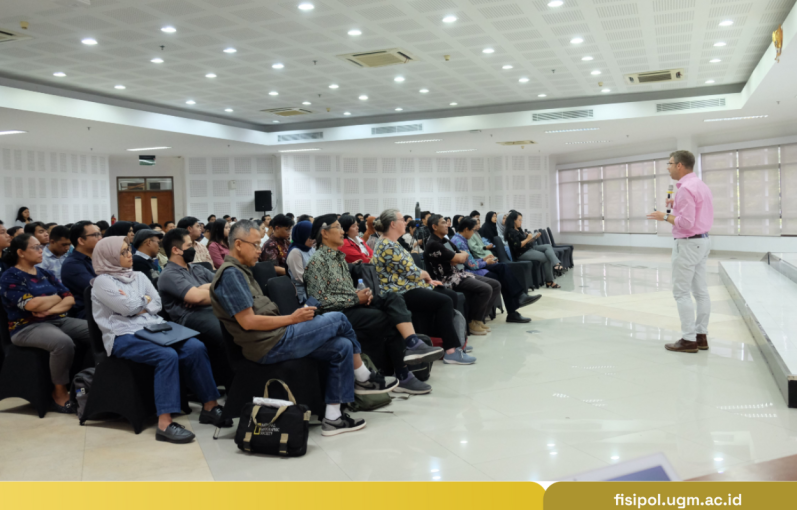
Dr. Wawan Mas’udi, S.IP., MPA, as the Dean of Fisipol UGM, welcomed all the postgraduate students who were officially accepted to Fisipol UGM with open arms. “Welcome and happy learning. It is expected that once in the postgraduate level, all of you can further explore social, economical, and political phenomenons not only as empirical aspects, but as a framework that requires discipline,” Dr. Wawan mentioned. He then went on to explain that Fisipol UGM provides the much needed access for students to create, build their career, as well as networking.
Postgraduate education holds an important role in cultivating the development of knowledge. Dr. Wawan explained further that the faculty has an agenda to make Fisipol UGM as the center for the development of the study of social and political sciences. Of course, this mission is not only aimed at reaching new heights nationally, but globally as well. Because of that, Fisipol UGM always tries to build international networks in order to further push the development of the study of social and political sciences even wider. “If we want to be the global center for knowledge, it is necessary for Fisipol UGM to interact with the outside world. The academic world is broad and borderless,” Dr. Wawan explained. He also explained the three flagship research that Fisipol UGM owns, which includes the research regarding climate change, digital transformation, and social inclusivity. The development of these three flagship research cannot be separated with the roles of postgraduate students in responding to these issues through a global academic lens.
The welcoming event was continued with the presentation of basic public policy by Dr. Rob Manwaring. Dr. Rob explained the important foundations regarding the field of public policy and why the development of this field is very important. According to him, the government carries an important mandate in organizing the livelihood of thousands or even millions of the population. The process of decision-making then has to consider the interests and needs of the people as a whole. Rob then elaborated the two main elements in public policy, that is the tool and instrument of the government.
“One of the instruments in public policy is the law. The government of Australia, in some cases, used the law as the main instrument, although the people-centered perspective is still used,” Dr. Rob mentioned. He gave several examples in how the government handled the problems of drivers going over the speed limit and Driving Under the Influence (DUI). For some time, Australia experienced a spike in traffic fatalities due to crashes. Responding to this issue, the Australian government then gave out sanctions to drivers who were caught to be under the influence by taking away their drivers license.
The regulation was tightly enforced. In 2015, if someone had finished their sentence, the government would place trackers to their vehicle, monitoring their movements for months. According to Dr. Rob, this is a very effective way to deter people from breaking the law again. On the other side, the government still educates and warns the citizens informally as well.
“There were many warning posters that were put up not only to encourage citizens to avoid driving while under the influence, but they were also intended to nudge their emotions,” Dr. Rob added. Some posters are intentionally designed with provocative words so that citizens will really understand and pay attention to the warning posters.
The field of public policy is understood to be a field that studies how to manage the behavior of citizens. The main implementation is perhaps for the government, but it can also be used to further understand complex socio-political phenomenons. “If you want to study public policy, you will most likely never stop studying about the behavior of people in society,” Rob argued.
The welcoming event for Fisipol UGM’s postgraduate students became a way to introduce the many dimensions of the study of social and political sciences. As the mission of the faculty is in line with implementing Quality Education (SDG 4), the commitment of Fisipol UGM to become the center for global study can be developed even further.
